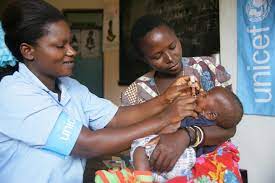The United Nations Children’s Fund (UNICEF), in partnership with the Taraba State Government, has launched an integrated immunisation campaign targeting more than one million children across the state.
The Chief of UNICEF’s Bauchi Field Office, Dr. Nuzhat Rafique disclosed this at the official flag-off of the polio vaccination campaign held in Jalingo, the state capital.
Rafique stressed the importance of vaccinating all children between the ages of 0 to 5, especially those in hard-to-reach communities, to eliminate polio and other preventable diseases in Taraba.
“Today is a significant day for every child in Taraba. Polio remains a life-threatening disease, but one that is preventable through timely vaccination,” she said.
“There are more than one million children in Taraba, and each child deserves access to this vital vaccine. I urge all parents—mothers and fathers—to ensure their children are vaccinated.”
Rafique noted that this round of polio vaccination represents one of the final pushes in global efforts to eradicate the disease, with the world closely watching Nigeria’s progress.
The Chairman of the Association of Local Governments of Nigeria (ALGON) in Taraba and Chairman of Jalingo Local Government Area, Dr. Jauro Hassan applauded the long-standing partnership between UNICEF and the state government.
He praised Governor Agbu Kefas for his consistent release of counterpart funding, which has enabled the comprehensive immunisation of children across the state.
Hassan pledged to rally support from other local government chairmen to ensure the campaign reaches every eligible child, and he encouraged parents to fully participate.
The Executive Secretary of the Taraba State Primary Health Care Development Agency, Dr. Nuhu Tukura also thanked UNICEF and other stakeholders for their continued support of child health in the state.
Tukura explained that the campaign is an integrated health initiative combining polio and routine immunisations with additional interventions such as vitamin A supplementation, deworming, nutrition support, and health education.
“This integrated approach will not only increase immunisation coverage but also improve child survival rates and prevent future outbreaks of vaccine-preventable diseases,” he said.


